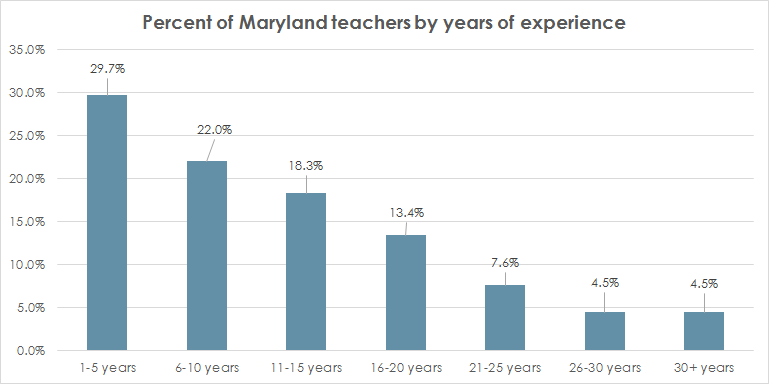Why New Teachers Leave…And What Might Help Them Stay
In Maryland, nearly half of new teachers will leave the profession by the end of their third year.

In Maryland, nearly half of new teachers will leave the profession by the end of their third year.
That’s a big problem, and one that needs to be addressed. Not only do new teachers deserve more and better support so they can succeed and thrive in the classroom, but students benefit from teacher stability, experience, and quality — which often go hand-in-hand.
The extreme rate of turnover is also incredibly costly. Richard Ingersoll, a University of Pennsylvania professor and leading researcher on teacher turnover, estimates that this rate of turnover costs school districts nationwide $2.2 billion annually. The estimated bill in Maryland? Somewhere between $20 and $45 million per year.
Right now in Maryland, the largest cohort of teachers are in those tenuous first five years in the profession. While it’s part of a huge generational change taking place across the U.S., Maryland is one of the states on the leading edge of the shift. According to the Learning Policy Institute, Maryland had the 8th most first and second year teachers in the country in 2014.

Why do teachers leave?
The Learning Policy Institute, an education research group headed by Stanford Professor Linda Darling-Hammond, identified six key factors that lead to teacher turnover:
· Inadequate preparation
· Lack of mentoring and induction support
· Challenging working conditions
· Dissatisfaction with compensation
· Pursuing other careers
· Personal reasons (pregnancy, child care, etc.)
Long hours, lack of respect, and lack of autonomy are also frequently cited by teachers who decide to leave the profession.
While Gallup research has found that teachers are excited about the importance of their work — they are more likely than other professions to regard their job as a “calling” rather than a career — a 2012 Gallup survey found that among employees in 12 different occupational categories, teachers were least likely to agree with the statement “At work, my opinions seem to count.” Combined with often subpar support for new teachers and the so-called “teacher pay penalty” compared to similar types of workers, it’s no surprise that teacher turnover has reached such alarming heights.

What could help teachers stay?
The Learning Policy Institute identifies six main policy areas that could help reduce teacher turnover:
· Improve teacher preparation and reduce costs to enter the profession
· Strengthen school and district hiring practices and personnel management
· Provide quality mentoring and induction for beginning teachers
· Improve teachers’ working conditions
· Increase teacher compensation
The New Teacher Center, a national non-profit organization dedicated to improving student achievement by supporting new educators, has focused on nine steps to improve new teacher mentoring and induction:
· Rigorous mentor selection based on qualities of an effective mentor
· Ongoing professional development and support for mentors
· Sanctioned time for mentor-teacher interaction
· Multi-year mentoring
· Intensive and specific guidance moving teaching practice forward
· Professional teaching standards and data-driven conversations
· Ongoing beginning teacher professional development
· Clear roles and responsibilities for administrators
· Collaboration with all stakeholders
How can Maryland better support new educators? Over the next several weeks, we’ll look more closely at the different factors that drive teachers from the profession — and some ideas that could help them stay. We’ll also share tips and resources from Maryland educators and MSEA, both on the MSEA Newsfeed and at our first-ever New Educators Conference on December 3. Have ideas for us or new educators? Share them in the comments section!

